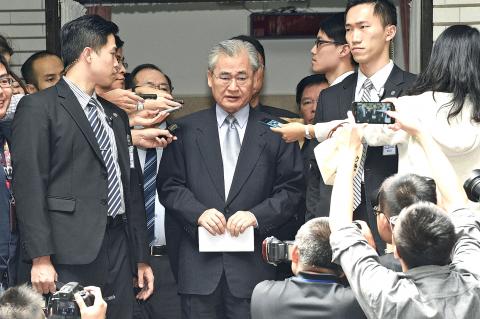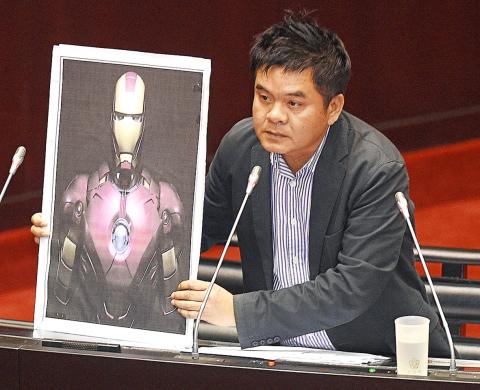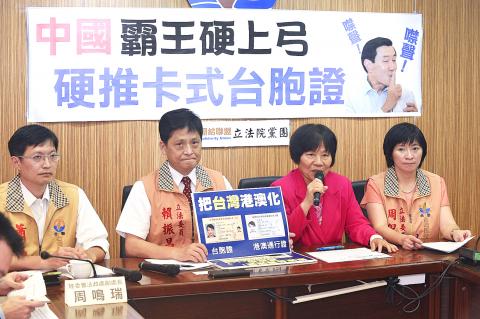China did not consult with Taiwan before implementing a new policy concerning the entry of Taiwanese visitors into its territory, Premier Mao Chi-kuo (毛治國) said yesterday, adding that the government is “extremely dissatisfied” with the lack of discussions.
“It has to be stated quite clearly that this is extremely hurtful to the feelings of our people,” Mao said during a question-and-answer session at the Legislative Yuan.
China notified Taipei about the new electronic card before its trial in July and its full implementation yesterday, but without prior consultations, Mainland Affairs Council Deputy Minister Lin Chu-chia (林祖嘉) said.

Photo: Chen Chih-chu, Taipei Times
There has been a lack of consultation despite Taiwan’s persistent demand that there should be prior consultations before any important policy concerning cross-strait relations is announced, Lin told lawmakers.
Taiwan had asked Beijing whether the use of the new card might be expanded, but no response has been received, Lin added.
The new credit card-sized travel pass replaces the “Taiwan compatriot travel document” (台胞證) that Taiwanese have used until now.

Photo: Chen Chih-chu, Taipei Times
In a public notice issued on Tuesday last week, Beijing said Taiwanese could apply to its public security departments above the county level to exchange their travel document for the new card and authorities would stop issuing paper documents yesterday.
Those who hold a paper “Taiwan compatriot travel document” could continue to use it until it expires, Lin said.
To coincide with the introduction of the new card, Beijing began in July to grant permit-free treatment to Taiwanese, which removed the need for an entry permit.

Photo: Chen Chih-chu, Taipei Times
The integrated-chip card system was implemented on a trial basis on July 1, less than a month after Beijing announced the change, and Taiwan was officially informed of the policy 20 minutes before it took effect, Mainland Affairs Council Minister Andrew Hsia (夏立言) said.
China’s unilateral decision to adopt the new card on such short notice showed disrespect for Taiwan, Hsia said during a visit to the US in July.
The switch to a smart card has created suspicion among many Taiwanese that Beijing is using it to downgrade Taiwan’s status to that of Hong Kong and Macau.
The card is similar to the “Hong Kong and Macau resident travel permit to enter the interior” (港澳居民來往內地通行證), which is also known as a “home visit permit” (回鄉證), critics have said.
Some Taiwanese academics have also voiced concern about possible data security breaches with the use of the card.
Experts have said that the smart chip embedded in the card would make it easy for Taiwanese tourists in China to be subjected to police surveillance.

INVESTIGATION: The case is the latest instance of a DPP figure being implicated in an espionage network accused of allegedly leaking information to Chinese intelligence Democratic Progressive Party (DPP) member Ho Jen-chieh (何仁傑) was detained and held incommunicado yesterday on suspicion of spying for China during his tenure as assistant to then-minister of foreign affairs Joseph Wu (吳釗燮). The Taipei District Prosecutors’ Office said Ho was implicated during its investigation into alleged spying activities by former Presidential Office consultant Wu Shang-yu (吳尚雨). Prosecutors said there is reason to believe Ho breached the National Security Act (國家安全法) by leaking classified Ministry of Foreign Affairs information to Chinese intelligence. Following interrogation, prosecutors petitioned the Taipei District Court to detain Ho, citing concerns over potential collusion or tampering of evidence. The

NEGOTIATIONS: Taiwan has good relations with Washington and the outlook for the negotiations looks promising, Minister of Economic Affairs J.W. Kuo said Taiwan’s GDP growth this year is expected to decrease by 0.43 to 1.61 percentage points due to the effects of US tariffs, National Development Council (NDC) Minister Paul Liu (劉鏡清) said at a meeting of the legislature’s Economics Committee in Taipei yesterday, citing a preliminary estimate by a private research institution. Taiwan’s economy would be significantly affected by the 32 percent “reciprocal” tariffs slapped by the US, which took effect yesterday, Liu said, adding that GDP growth could fall below 3 percent and potentially even dip below 2 percent to 1.53 percent this year. The council has commissioned another institution

NEGOTIATIONS: The US response to the countermeasures and plans Taiwan presented has been positive, including boosting procurement and investment, the president said Taiwan is included in the first group for trade negotiations with the US, President William Lai (賴清德) said yesterday, as he seeks to shield Taiwanese exporters from a 32 percent tariff. In Washington, US Trade Representative Jamieson Greer said in an interview on Fox News on Thursday that he would speak to his Taiwanese and Israeli counterparts yesterday about tariffs after holding a long discussion with the Vietnamese earlier. US President Donald Trump on Wednesday postponed punishing levies on multiple trade partners, including Taiwan, for three months after trillions of US dollars were wiped off global markets. He has maintained a 10 percent

TRADE: The premier pledged safeguards on ‘Made in Taiwan’ labeling, anti-dumping measures and stricter export controls to strengthen its position in trade talks Products labeled “made in Taiwan” must be genuinely made in Taiwan, Premier Cho Jung-tai (卓榮泰) said yesterday, vowing to enforce strict safeguards against “origin laundering” and initiate anti-dumping investigations to prevent China dumping its products in Taiwan. Cho made the remarks in a discussion session with representatives from industries in Kaohsiung. In response to the US government’s recent announcement of “reciprocal” tariffs on its trading partners, President William Lai (賴清德) and Cho last week began a series of consultations with industry leaders nationwide to gather feedback and address concerns. Taiwanese and US officials held a videoconference on Friday evening to discuss the